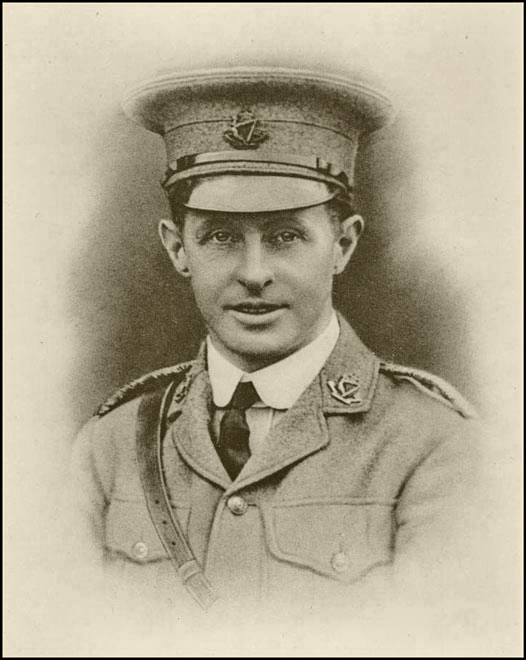![]() In memoriam
In memoriam ![]()
Lieutenant Samuel Barbour 'Barrie' Combe
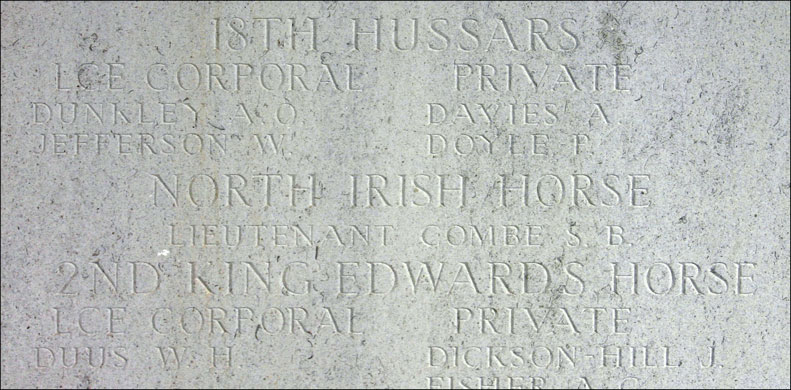
Samuel Barbour (Barrie) Combe, of Donaghcloney, County Down, was born at Malone Park, Belfast, on 20 January 1880, third son of engineer Abram Combe and his wife Emilie Caroline Combe (nee Nicholson). Educated at Rugby and in France, Combe was a member of the Ulster Club and the Royal Ulster Yacht Club, and was Master of the County Down Staghounds. On 12 March 1906 he married Mary Theresa Waring, sister of North Irish Horse officer Holt Waring. They had two children, Thomas Waring Barrie and Ruric Desmond.
Combe was commissioned as a second lieutenant on 20 October 1909 and posted to the North Irish Horse. On 22 April 1913 he was promoted to lieutenant.
He embarked for France with C Squadron of the North Irish Horse on 12 August 1914, seeing action in the retreat from Mons and the advance to the Aisne in August and September that year.
At the end of September he wrote a number of letters to his wife describing his experiences:
Near Soissons
23 Sep.The following is briefly what happened to us since you saw us off. We arrived at Le Havre 22 Aug and went into camp about 2 miles out. Staying there until night of Aug 24 – when we entrained and left at mid-night for St Quentin arriving there about 3 o’clock next day. We spent two days there being billeted in a slaughter house, this was the first time of the heavy fighting at Mons & Le Cateau which was close. We did not take any part in these fights. We could not get any orders from Headquarters, and after the fight was over the army made a rapid and general retreat. That was on the 27th Aug. At midnight Massereene decided to treck backward too, so we left St Quentin’s at midnight and went to La Fer arriving there 5 AM after a miserable night march in pouring rain. Here we stayed until 10 AM leaving at that hour & marching Via Chauny to Bretingy where we bivouaked 2 days. On this march I was sent out to scout & saw my first German – as we saw a party of Uhlans far away.
At the end of two days i.e. night Aug 30 we started 5 p.m. & marched all night, loosing our transport wagons on the way and reaching Attichy. There I was sent back with an orderly to find waggons which I did and brought them to Attichy where I arrived 8 p.m and immediately was sent off with a waggon of gun cotton to deliver 5 miles off to the Engineers, while the remainder of the squadron marched to Heute-Fontaine. I got rid of wagon at 5 next morning & overtook squadron at H.F. at 8 A.M. but had to move out at once and marched to Vanciennes and Monteuil where I got a good night’s rest. However we had to leave at 4 a.m. and marched to Vantimes where we were under fire for the 1st time, being shelled by Germans for 12 hours. Both men & horses stood it splendidly and we had no casualties. Next day I was sent out as right flank guard to the Division and chased three German Uhlans killing one and taking his horse. We then marched to Boulears. I was again delaid from squadron to act as an escort to a company of R.E. who were blowing up bridges & I got that job done at 5 P.M. and followed up squadron to where they had been ordered to go to, but these orders had been altered and I missed them. I spent night in a clean pigsty and moved next morning 3 A.M. and rejoined squadron.
Spent first slack day for many days, and washed and shaved and generally cleaned up – that was Sep 5th. However got orders at 8 P.M to march to Tournant, and marched all night. I took bad with cramps and had to be slung in a wagon – was awful bad. Next day spent at a Chateau of Tournan where we licked our sores and recovered.
The following day we marched by Ville Neuve to Dammartin where we had a scrap with Uhlans & knocked blazes out of them. They fled in all directions N.I.H. pursuing gallantly – I took another horse but had to shoot it.
Tournan was the turning point of our retreat and from that the Germans who had been pushing on Paris started to retire.
Since then we have been pushing them back and are now halted at a place near Soissons where Germans hold a very strong position but where they are being slowly surrounded. We have been under fire constantly. I have lost one man shot & 6 horses, & four or five men sick and one man missing.
The shell firing is very terrifying but not very effective.
I think shrapnel is the worst as it burst over such a large area.
My troop had a gallop across open over ½ a mile with shrapnel bursting all round.
One day I went down with an orderly to examine a bridge and a large shell burst just beside me. I galloped back over a plain pursued by 6 shells bursting just beside & behind me – very frightened at times – rather amusing afterwards. Now one does not care a damn for shells. We never interrupt our conversation when one bursts near one.
We are in a splendid little house here, and have had a good weeks rest.
I shall have great stories to tell you. I have seen some awful sights, but one becomes inured to such things – one thinks of nothing but one’s self and one’s own troop. I hope to get this letter censored and sent through direct. Some say if we gather up the German army it will end the war. Their artillery is magnificent but infantry & cavalry worth very little.
Their much vaunted Uhlans even the N.I.H. hunted like sheep.
I will try to write you another long letter.
My trophies of war were two complete saddles, with sword and carbine & a lance, but I had to leave them. However I have kept one sword which I hope to bring home.
We are all very well. Some of the other troops of the Squadron have lost 5 or 6 men.
Searches-ner-Soissons
Sep. 24The part we have taken in this war may be divided into 3 separate phases.
1st hurried retreat before German army – after battles of Mons & Le Cateau. Retreat lated Aug 26 – Sep. 6.
2nd Equally hurried pursuit when the enemy suddenly abandoned Paris (Sep 6). They retreated to present position on river Aisne where they arrived Sep. 12.
3rd More or less siege of the Enemy’s position on the Aisne which is now going on and which has lasted ever since.
During Nos 1 & 2 Phases the hardship was considerable. We used to arrive at a place bivouac for a few hours and away again at 3 in the morning. We were never off saddle a moment during day-light & would usually not reach our destination before 9 or 10 at night. During that time we never had our clothes off for a week at a time, and we were provided with a luxuriant beard, each of us.
Since arriving here we have had a most luxurious time of it and Alec West, Stewart Richardson & I are living in a rich Frenchman’s shooting box. The people themselves have fled and have left everything all standing. It happens to be one of the few places the Germans have missed on their way and it is absolutely untouched.
Massereene and the other two officers are living at a farm beside us, but are not anything like as comfortable.
There is a place called Ciry where each troop of the Squadron have to take turns in guarding and generally it is a very hot little corner as some times during the day the Germans light a few shells on to it. Last time I was down we were very nearly caught.
However the last few days things have been very quiet there, and it has not lived up to its reputation.
It is very sad to see the havock made in the country by the passage of so many troops over it. First the Germans passed over it going out and then coming back, finally we ourselves following them up. However we have been able to live very well by dint of buying bread, milk and eggs & butter to eke out our ordinary rations.
We are getting very fat during the last few days – we got a bit fine drawn during our first three weeks. This squadron (not counting Jack Grant’s troop which is at head quarters) has seen more service than any of the other N. Ir. Horse Squadrons and indeed has seen quite as much as the average regular corps.
I am keeping a careful diary. Harry Charley was wounded but whether badly or not I did not hear. The Norfolk Regiment is just beside us here & I encountered Col. Ballard and Cpt Bagwell the other evening.
Greer, McNeil, & the two gentlemen recruits who you saw at the Northern Counties Hotel have proved a great success. They are two of the best men I have got. Also I have a son of Dr Darling in my Troop and a young Coey – all good men.
[29 September]
Dearest Old Darling,
I got another two letters from you this evening, one dated the 4th Sept. and the other the 2nd Sept. It is very funny how the letters arrive – first one quite lately written, then one written weeks ago and so on. You do not know how I prize your dear letters. I read them over and over again, and read extracts to the other officers until they must think me a terrible bore. As a matter of fact they do not, as anything that savours of home is very welcome. For instance my Troop asked for the loan of the photos you sent me (including yours) and passed them round from hand to hand.
The latest letter I have got from you is one dated 18th Sept. which I got yesterday.
Things are much the same as usual. I was up at 3 a.m. this morning, and my Troop is doing this same old observation job, which is either very exciting or very slow. However the Engineers have spoilt the job by building bomb-proof shelters for us, and when we are shelled we retire into them, instead of fleeing wildly as we have always done up to the present, to cover. We take it in turns to do this job.
Yesterday Bertie Magill turned up and lunched with us. I was out as I had ridden over three miles to the Norfolk Regiment to lunch with them, as they asked me to do. It was rather exciting as I had to pass over an open plain where 3 officers & 22 men were killed by shell-fire the day before but nothing untoward happened.
I must close now so with the very best love to the dear old boys, and tons to yourself.
Ever your loving old Barrie
This would be his last letter. On 30 September Combe and his troop was taking their turn at a farmhouse observation post overlooking the enemy lines on the Aisne. Soon after midday Combe was ordered to ascertain whether the Germans had evacuated Condé village, which sat on the far side of the bridge, in the shadow of Condé Fort. Combe had led a scout troop of the North Irish Horse while in Ireland, and was therefore well equipped for the task.
He set out with one man, Private Norman Darling, telling his Sergeant that no search party should be sent out if he did not return. Passing through the line of piquets, they rode to withn 200 yards of the bridge, and then left Darling and two horses under cover in a sandpit and went on on foot, well aware that this area was swept by artillery and rifle fire from the German position on the higher land on the other side of the river, and presented little cover. After a couple of hours Darling became concerned and, leaving the horses, went in search of his officer. He made his way to the bridge by dusk and hunted up and down the river bank but finding no trace, returned to the outpost. Privates McIlwaine and Greer volunteered to search for Combe, but met with no success.
Hopes were held that Combe had been captured. His commanding officer Lord Massereene wrote to Combe's wife:
All the facts I have been able to ascertain point to your husband having been taken prisoner by the Germans, especially as the man who was with him and who was left behind in the sand-pit only about 300 yards from the bridge is positive that he heard no shots fired. ...
I am more sorry than I can say at the loss which I and my squadron have sustained at the disappearance of your husband, who is a most capable officer in every way, and greatly liked by every one.
I cannot help thinking that your husband has been captured and is now on his way to Berlin.
Richard Irwin wrote home “I am very sorry that Lieutenant Combe has been captured. Of course he will be all right, but we will miss him, for he was loved by everyone of us. He was a gentleman and every inch a soldier.” Robert Sterling wrote: “We lost one of our own officers a few days ago – Lieut. S. B. Combe. He was out reconnoitring, and never returned. He is now posted amongst the missing. We all hope the worst has not happened, as Mr. Combe was very popular throughout the whole squadron.”
However his fellow officer Richard West feared the worst:
6.30 P.M. received word that Barry had gone out with 1 man to find out if Condé was still occupied at 1.20 PM & had not returned. Sgt Irwin returned with troop 8.30 no news of B – Condé occupied by Germans. Darling returned 9.30 with B horse having waited in sandpit 200 yds from Condé bridge till dark. B had advanced alone on foot to reconoitre – evidently walked into German outpost & either shot or captured. afraid he would stand poor chance as he had flat nosed bullets.
Later however, news of his fate came to his family via a German officer, Ottakar Vollert, who wrote through neutral channels:
Will you drop a few lines to Mrs. Combe, widow of the lieutenant of the North Irish Horse, who was shot by us when approaching our position most bravely. We buried him near the Castle of Conde, and have made a nice cross with the words ‘Pro Patria’ and name. He was a brave soldier. War is most terrible, and it seems that there is no end of it. Let us hope that it will ultimately clear the atmosphere.
Barrie Combe was the first North Irish Horse officer killed in the war. The location of his burial near Condé Castle was soon forgotten, and he is now commemorated on the Le Touret Memorial, Pas de Calais, France, Panel 1. The inscription appears under the first arch to the left in the picture below.
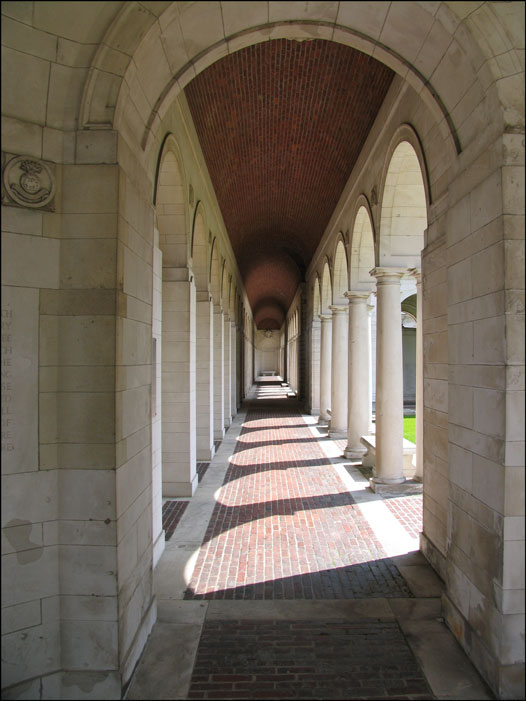
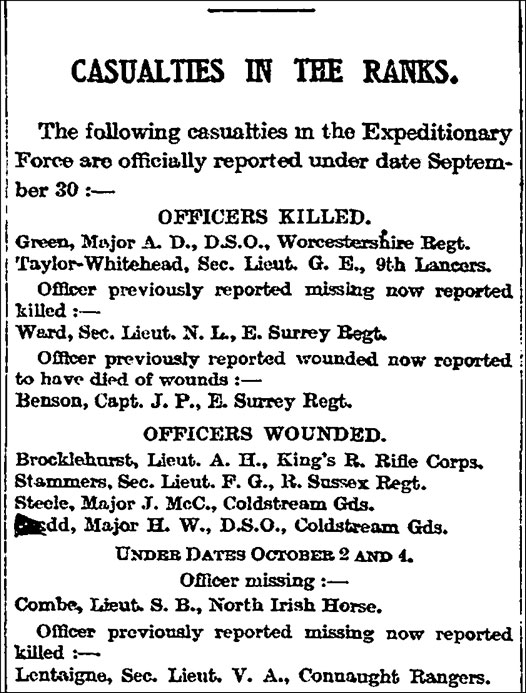
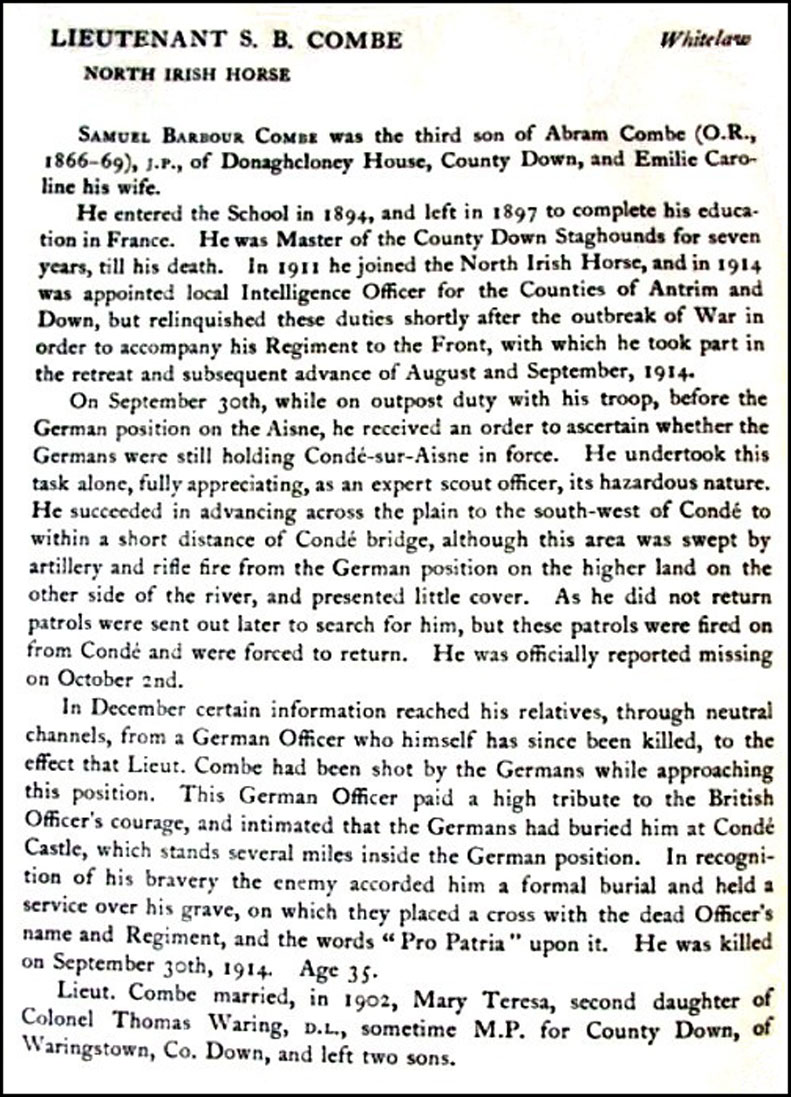
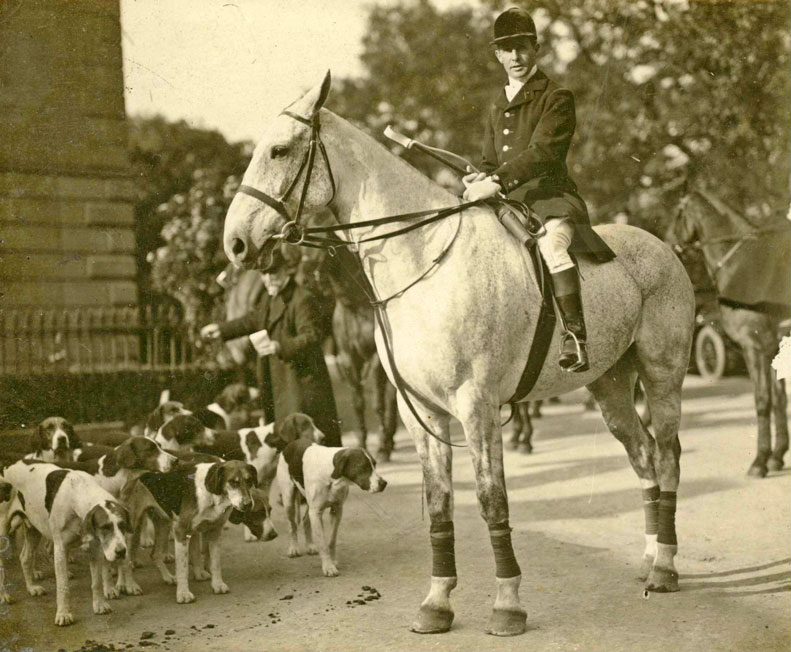

Combe inspecting his troop of the North Irish Horse in August 1914
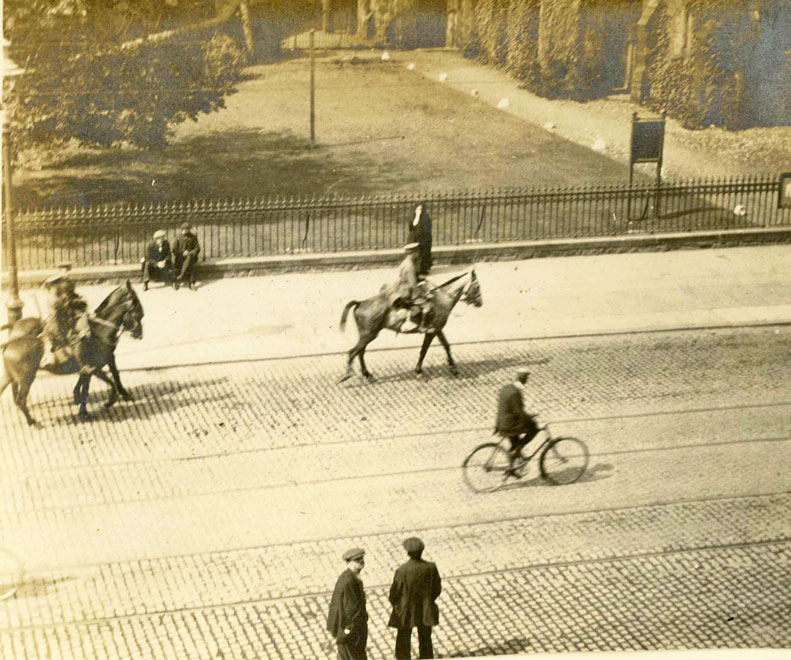
Combe leading his troop in August 1914, possibly in Belfast
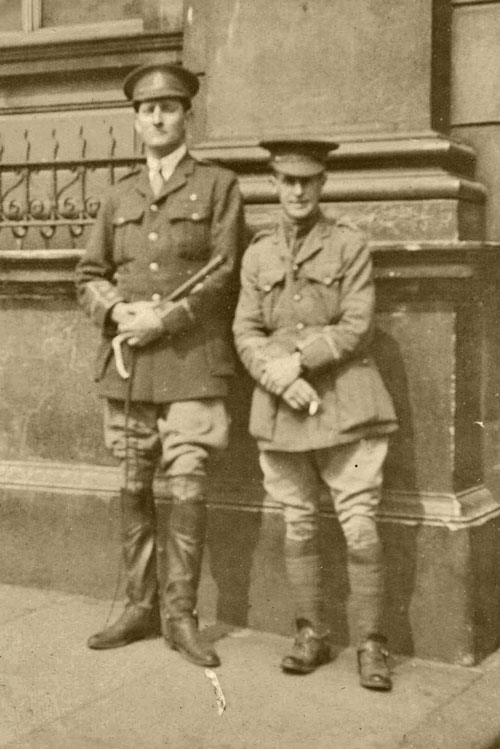
Combe with North Irish Horse officer Richard Annesley West in August or September 1914
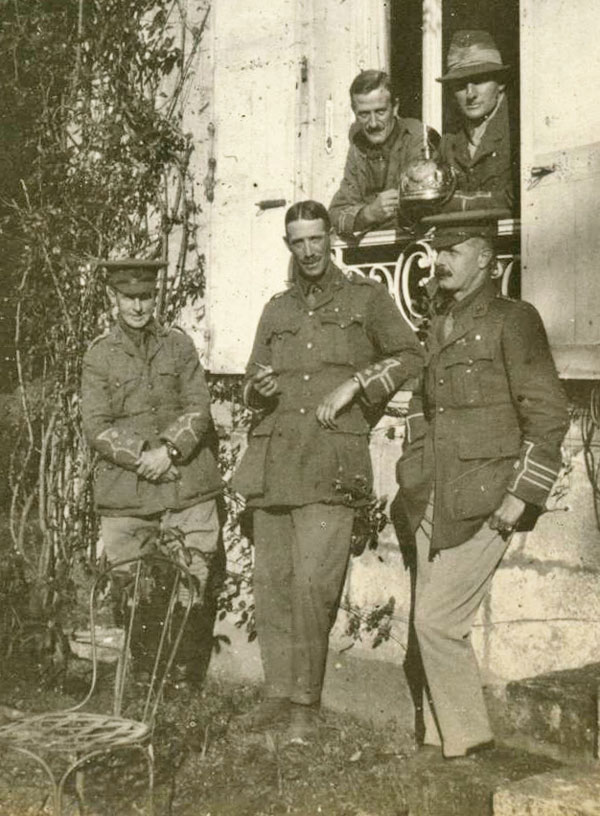
Combe with his fellow officers at Chateau Dhuizy on 24 September 1914. Standing left to right Combe, Stewart-Richardson, Massereene. Richard Annesley West is the man wearing a slouch hat (note his prized souvenir, a German cavalryman's helmet).
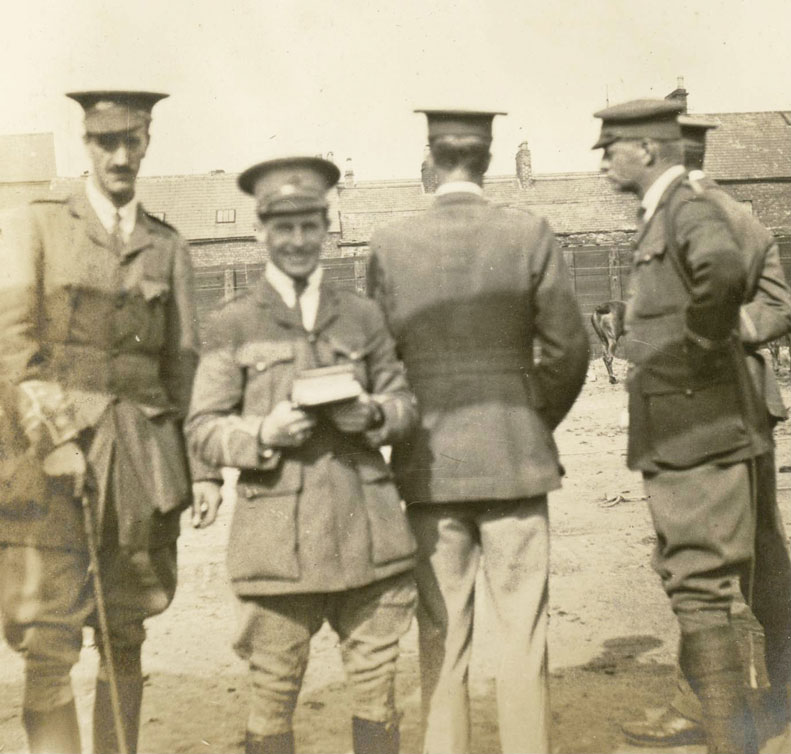

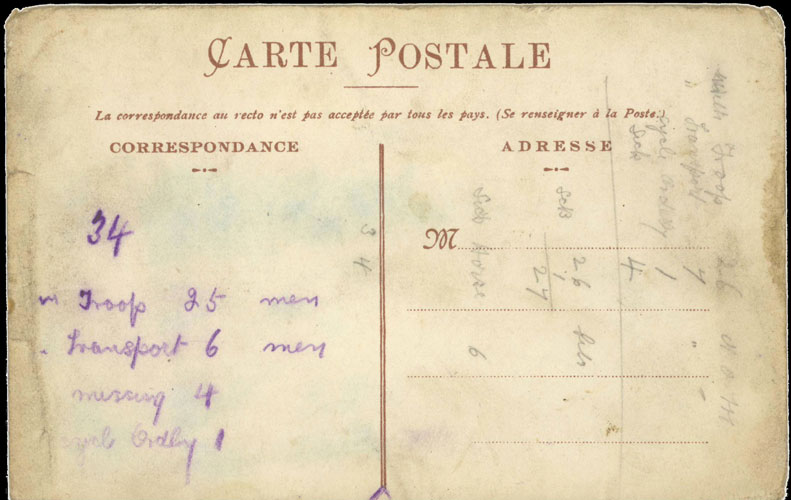
Postcard purchased by Combe. On the reverse he has written casualty details in his troop.
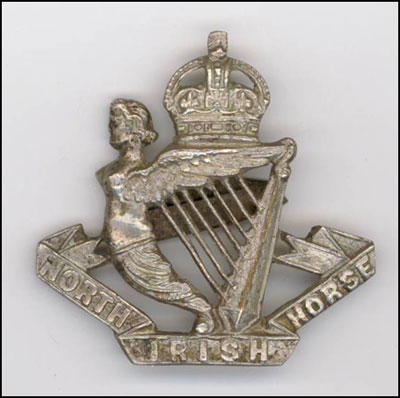
Combe's cap badge
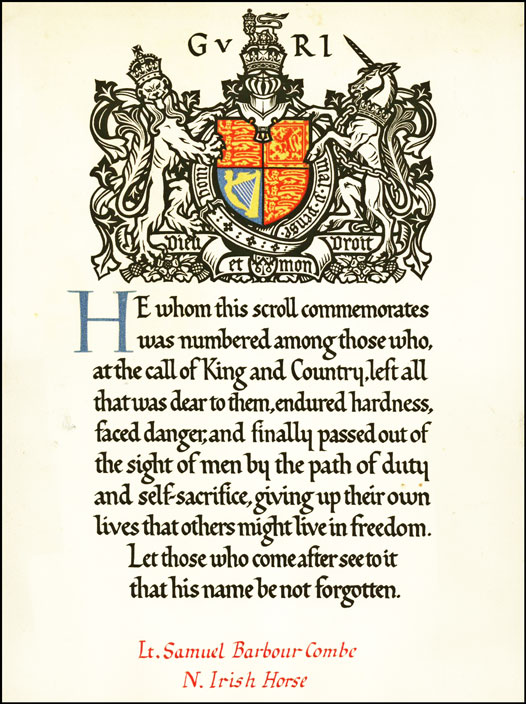
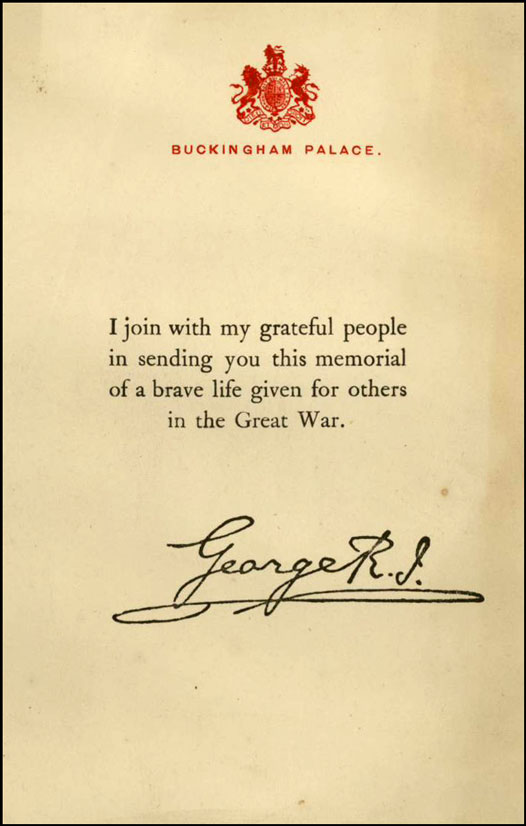
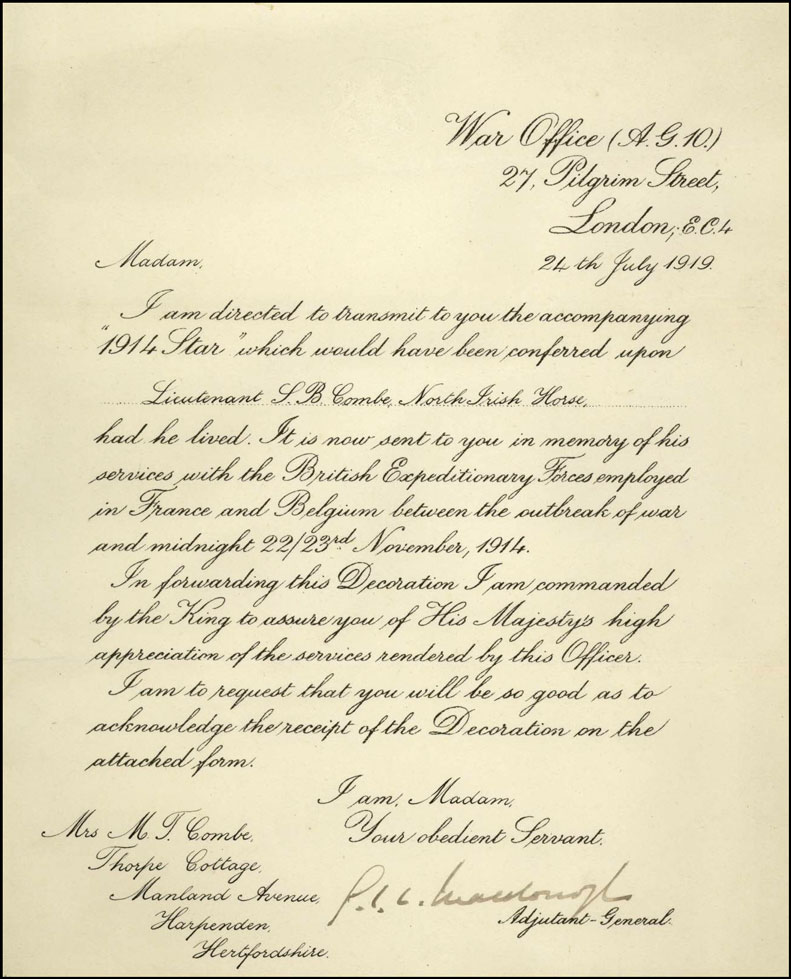
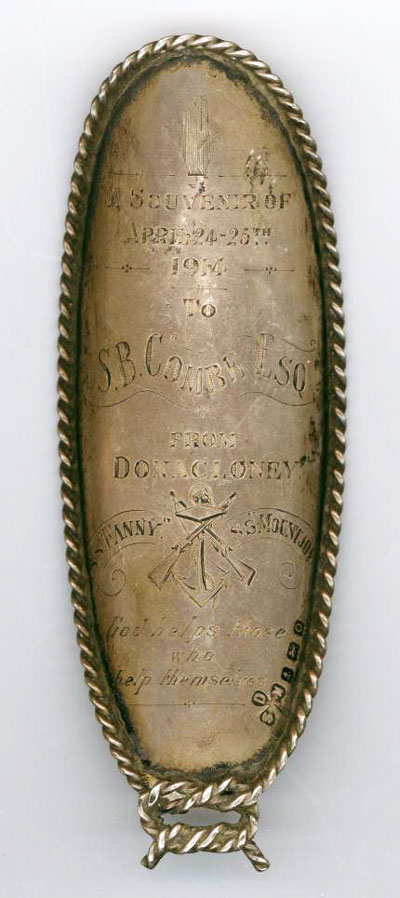
Silver plaque presented to Combe following the Larne gun-running inscribed with the red hand of Ulster, a ship’s anchor and crossed rifles, and the text:
A SOUVENIR OF
APRIL 24–25TH
1914
To
S.B.COMBE ESQ.
FROM
DONACLONEY.
S.S.“FANNY”. S.S.“MOUNTJOY”.
God helps those who help themselves
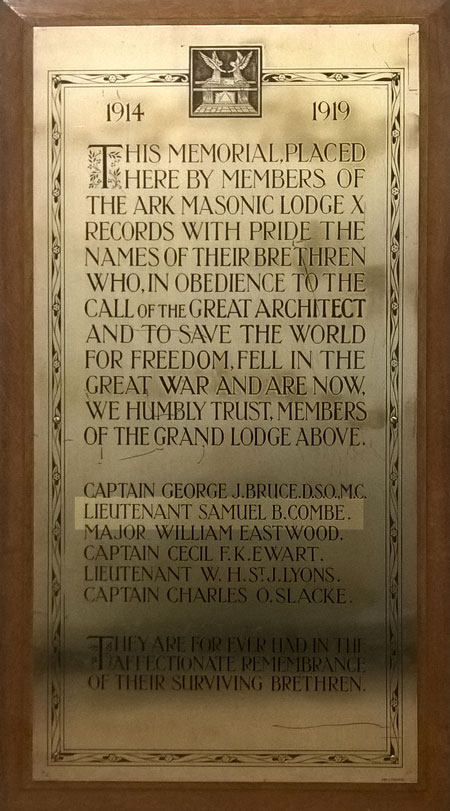
Image of Le Touret Memorial Copyright © Phillip Tardif with all rights reserved as set out in this Use of Material policy. Images of Lieutenant Combe, his cap badge, silver plaque, memorial scroll, 1914 Star letter and Royal condolence letter from papers held by the website owner. Image of Le Touret Memorial inscription kindly provided by Steve Rogers, Project Co-ordinator of the The War Graves Photographic Project, www.twgpp.org. Clipping 1 from The Times 7 October 1914, clipping 3 kindly provided by Gerry Chester - original source uncertain. Image from the Ark Masonic Lodge kindly provided by Nigel Henderson, Researcher at History Hub Ulster (www.greatwarbelfastclippings.com).

